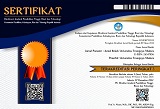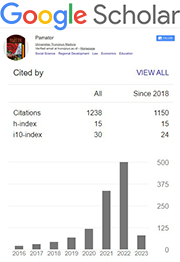The Impact of Agile Leadership and Organizational Culture on Work-Life Balance (A Study at Regional Office I of the Badan Kepegawaian Negara)
Abstract
Research Aims: The goal of this study is to explore the impact of agile leadership, organizational culture on work-life balance of employees at the Regional Office I of the Badan Kepegawaian Negara (BKN).
Design/methodology/approach: The study was carried out at the Regional Office I of the Badan Kepegawaian Negara (BKN) in Yogyakarta, involving 104 participants chosen using purposive sampling. Data was collected through a Likert scale questionnaire and evaluated through the Partial Least Squares Structural Equation Modeling (PLS-SEM) method.
Research Findings: The finding of this research highlight that both agile leadership and organizational culture significantly influence work-life balance. Statistical analysis revealed that these two factors have a vital impact on improving the balance between work and personal life for employees. Agile leadership contributes to greater flexibility in work management, enhancing job satisfaction and employee motivation. Meanwhile, organizational culture, particularly a supportive and inclusive culture, has an even stronger impact on work-life balance. This indicates that a combination of adaptive leadership and a culture that focuses on the well-being of employees is crucial for achieving optimal performance in organizations.
Theoretical Contribution/Originality: This research offers a valuable theoretical contribution by integrating the concepts of agile leadership and organizational culture in the context of work-life balance in public sector organizations, specifically in BKN. It fills a gap in existing literature by demonstrating how these two variables can work together to enhance employee well-being. Furthermore, the study broadens the understanding of how a supportive organizational culture, focusing on flexibility and balance, directly influences employee satisfaction and performance. Therefore, this research provides a fresh perspective on how public organizations can manage work-life balance to improve productivity and long-term effectiveness
Keywords
Full Text:
PDFReferences
Ahmed Sait, S., Sunildutt Sharma, M., & Kumar, Ks. (2023). The Role of Organizational Culture in Promoting Work-Life Balance: A Literature Review. 44(8).
Aju, I., Ratih, B., & Nurhakim, L. (2025). The Influence Of Agile Leadership, Work Ethic, And Workload On Employee Performance At The Department Of Population And Civil Registration In Pasuruan Regency With Work-Life Ba. International Journal of Economic Literature (INJOLE), 3 (2), 426–437. https://www.researchgate.net/publication/388497162
Apriyanto, P., & Haryono, S. (2020). Pengaruh tekanan kerja, beban kerja dan lingkungan kerja terhadap intensi turnover: Peran mediasi kepuasan kerja. Manajemen Dewantara. https://jurnal.ustjogja.ac.id/index.php/manajemendewantara/article/view/7672
Arifin, R., & Purwanti, H. (2023). Examining the Influence of Leadership Agility, Organizational Culture, and Motivation on Organizational Agility: A Comprehensive Analysis. Golden Ratio of Human Resource Management, 3(1), 33–54. https://doi.org/10.52970/grhrm.v3i1.205
Bäcklander, G. (2019). Doing complexity leadership theory: How agile coaches at Spotify practise enabling leadership. Creativity and Innovation Management, 28(1), 42–60. https://doi.org/10.1111/caim.12303
Brue, K. L. (2018). Harmony and Help: Recognizing the Impact of Work-Life Balance for Women Leaders. Journal of Leadership Education, 17(4), 219–243. https://doi.org/10.12806/v17/i4/c2
Clark, M. A., Sanders, K. N., & Baltes and Boris B. (2023). Achieve Work-Family Balance Through Individual and Organizational Strategies. Dalam Principles of Organizational Behavior (hlm. 531–549). https://doi.org/https://doi.org/10.1002/9781394320769.ch26
Groner, E. S. (2018). The Effect of Organizational Culture on Work-Life Balance. https://cupola.gettysburg.edu/student_scholarshiphttps://cupola.gettysburg.edu/student_scholarship/643
Haar, J. M., Russo, M., Suue, A., & Ollier-Malaterre, A. (2019). Outcomes Of Work-Life Balaace Oo Job Satisfactioo, Life Satisfactioo Aad Meetal Health: A Study Across Seve Cultures.
Hair, J. F., Risher, J. J., Sarstedt, M., & Ringle, C. M. (2019). When to use and how to report the results of PLS-SEM. European Business Review, 31(1), 2–24. https://doi.org/10.1108/EBR-11-2018-0203
Hindustan, S. R., Chandra Bahuguna, P., & Rawat, N. (2023). Performance Management in Public Sector Organizations: A Bibliometric Analysis International Journal Of Organizational Leadership. Dalam Article in International Journal of Organizational Leadership. https://www.ijol.cikd.ca
Jannata, A., & Surya Perdhana, M. (2022). Analisis Pengaruh Work-Life Balance Terhadap Employee Engagement Dengan Job Satisfaction Sebagai Variabel Intervening (Studi Pada PT Barata Indonesia). Diponegoro Journal Of Management, 11(1). http://ejournal-s1.undip.ac.id/index.php/dbr
Kasfunnuri, M. A., & Sopiah. (2022). Budaya Organisasi: Systematic Literature Review Dan Analisis Bibliometrik. Transekonomika: Akuntansi, Bisnis Dan Keuangan, 2(6), 457–467. https://doi.org/10.55047/transekonomika.v2i6.326
Klajkó, D., Restás, P., Szabó, Z. P., Czibor, A., Dóra, K., Péter, R., Péter, S. Z., & Andrea, C. (2019). The Effect of Organizational Culture on Employee Well-Being: Work-Related Stress, Employee Identification, Turnover Intention. Dalam Journal of International Cooperation and Development www.richtmann.org/journal (Vol. 2, Nomor 2). www.richtmann.org/journal
Komala, I., Nursifa, D., Khodijah, S., Mardhotillah, A., & Setyaningrum, R. P. (2023). Pengaruh Servant Leadership, Organizational Commitment Terhadap Employee Performance Serta Work Life Balance Sebagai Mediator Pada Universitas Pelita Bangsa. Jurnal Ekonomi Syariah Pelita Bangsa, 08, 166–175. https://doi.org/10.37366/jespb.v8i02.814
Kresnawan, H., Abbas, B., & Putera, A. (2023). Peran Organizational Citizenship Behavior (OCB) Dalam Memediasi Pengaruh Agile Leadership Dan Knowledge Sharing Terhadap Kinerja ASN Pada Sekretariat Daerah Provinsi Sulawesi Tenggara. MANOR: Jurnal Manajemen dan Organisasi Review, 5(2). https://doi.org/10.47354/mjov5il
Kurnia, A. (2024). Agile Leadership and Innovative Work Behavior : The Mediating Role of Organizational Climate. 13(3), 395–401.
Kurniawan, S., Hardiyanti, D., & Sari, E. W. (2022). The Role of Workload and Organizational Culture on Employee Performance with Work Life Balance as an Intervening Variable during a WFH & WFO Implementation. IEOM Society International © IEOM Society International 625, 625–634.
Munawar, M., & Suriyanti, S. (2024). The Effect of Organizational Culture, Work-Life Balance, and Job Satisfaction on Non-Commercial Employee Work Engagement. Golden Ratio of Human Resource Management, 4(1), 53–66. https://doi.org/10.52970/grhrm.v4i1.452
Northouse, P. G. (2022). Leadership : theory and practice / Peter G. Northouse. Dalam Leadership : (9th ed.). Los Angeles, Calif. : SAGE.
Sitinjak, A., & Isa Indrawan, M. (2023). The Influence of Leadership on Performance with Work Life Balance as an Intervening Variable at BPJS Employment Sumbagut Regional Office. SINOMICS JOURNAL | Volume, 2(5). https://doi.org/10.54443/sj.v2i5.218
Susanto, B., Wiguna, W., & Tukiran, M. (2023). The Effect Of Inclusive Team, Agile Leadership, And Organizational Agility On Organizational Performance (A Literature Review in a Communication Company). International Journal of Economy, Education and Entrepreneuship, 3(1), 53–62. https://doi.org/10.53067/ije3.v3i1
Sutanto, E. M., Sigiols, P. J., & Wijaya, E. N. (2024). Work-Life Balance, Employee Engagement, Job Satisfaction, And Indonesian Employees’ Performance. International Journal of Business and Society, 25(3), 832–851. https://doi.org/10.33736/ijbs.8355.2024
Syafitri Andra, R., Nayati Utami, H., & Wulida Afrianty, T. (2022). Pengaruh Perceived Organizational Support Dan Organizational Culture Terhadap Work-Life Balance Karyawan. https://profit.ub.ac.id
DOI: https://doi.org/10.21107/pamator.v18i3.30599
Refbacks
- There are currently no refbacks.
Copyright (c) 2025 Vivilia Basuki

This work is licensed under a Creative Commons Attribution-ShareAlike 4.0 International License.
Jurnal Pamator : Jurnal Ilmiah Universitas Trunojoyo by Universitas Trunojoyo Madura is licensed under a Creative Commons Attribution-ShareAlike 4.0 International License.















.png)